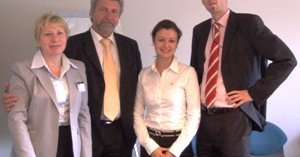Mr Milinkevich, you are always mentioning in your speeches the word “solidarity” – what kind of support would you expect or need from the neighbouring or other European countries?
We understand solidarity as mutual support that appears when there is an awareness of common goals, common values and common ideas. We would like that more and more people in Europe realize that Belarusian democrats struggle for expansion of the area of peace, democracy and well-being, for those values around which the European identity is built.
Do you think that the main world players, especially the EU, have done enough to help the opposition or Belarus people fight the regime?
While we appreciate very much the support provided by the European countries for the democratic forces in Belarus we have to admit that this is still not enough. Belarus issue is not, so far, a top priority of the EU member states. A common task, both for the EU governments and the democratic forces of Belarus, is to show to the Byelorussian society a real alternative to the authoritarian regime of Lukashenka and to his economic model. Such alternative can be only seen within the common European area of freedom and prosperity. The Belarusian society needs as many direct contacts as possible with the united Europe. There is a huge potential for cooperation between Belarusian and European civil societies. Byelorussians need more knowledge about democracy, human rights and market economy. Together with our European partners we can promote cooperation in the fields of educational and youth exchanges. The visa regime should not be a barrier for contacts. Visa costs should not be increased, on the contrary reduced or even abolished. The united Europe should not deny Byelorussians with working opportunities.
Each Belarusian should see the advantages of living in an open dynamic society with market economy and respect for political and social rights.
Each Belarusian should see the advantages of living in an open dynamic society with market economy and respect for political and social rights. We expect that the EU countries and the United States of America develop a common approach towards Belarus based upon the universal democratic values and not upon trade-offs with Belarus powerful neighbour who provides energy to Europe.
Have you heard about the JEF action for Belarus that took place back in March in 60 cities around Europe? And what do you think about this kind of initiatives? Do they serve as an encouragement message for Belarus people and do they help to get closer to a democratic transition?
We are very grateful to JEF for its Belarus action campaign in many European cities. The perception of the fact that Byelorussians are remembered and expected in Europe gives certainly the strength to all our citizens who stand against the authoritarian regime. It is a particular pleasure to realize that it was a youth organisation that carried out these actions. The solidarity of young people of Europe is very important for the Belarusian youth that resists the regime. We hope very much that on October 14 when we organize the European March in Minsk JEF will continue its Action in support of the future free and European Belarus.
How is the political situation back at home? Is still the opposition strong and united? How much support Lukashenka has now from the people? And how would you explain the popularity of Lukashenka taking in consideration that he is not even a member of any political party?
As a result of the 2006 electoral campaign, the situation in Belarus has changed considerably. The regime is losing the lead; the number of its opponents has grown. Many people have overcome fear and they are ready for further action. They proved to be capable of self-organizing. We have built the system of solidarity with the repressed people. The faith in stability of the regime has been shaken among its adepts and bureaucrats. The international community has seen a new image of Belarus and its democratic forces. Today, nobody in European capitals questions whether the people of Belarus really want freedom and independence. The opposition undergoes a period of transformation. We have a change of generations. New activists and leaders are coming to the front. Over the past years the opposition structures have often failed both to gain confidence in the eyes of all citizens who disagree with the authoritarian policies and to get all democratic minded people of Belarus to be involved in common actions. The Movement for Freedom, I created, aims at consolidating the democratic part of the civil society. Our task is to create communities of free and cooperative citizens across the whole country. How the Belarusian opposition will look like will be seen in the nearest future.
Unfortunately, Lukashenka is still quite popular in the eyes of a significant part of my people due to his populism and propaganda. He tries to preserve an image of a “good father to ordinary people. The state controlled media do everything to show that Lukashenka is the only one politician in Belarus. The role of a party leader does not fit the image of Lukashenka. If even the pro-Lukashenka party is created it will be the typical “power party” completely controlled by the dictator who does not hesitate to manipulate elections.
And on an optimistic note: when would you predict a free and democratic Belarus?
The situation in Belarus changes very quickly. A new generation is coming in. This is the generation that does not remember the Soviet times and that grew up without many communist prejudices. This generation wants more freedom, freedom of thoughts and self-expression. The autocratic rules of the current regime do not match such ideals. This generation requests something more than simply “stability”. Therefore, I am optimistic. I believe that Belarus will soon join the family of free European nations.


Follow the comments: |
|
